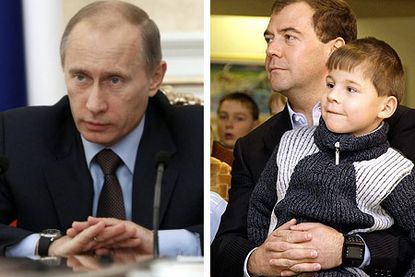Cyber war or gas ransom? How Russia could react to sanctions
Russia says US and EU sanctions are 'absolutely unacceptable' and warns of reprisals

Russia has reacted angrily to the EU's resolution to expand sanctions on Russia following the downing of Malaysia Airlines flight MH17, describing the measures as "absolutely unacceptable".
Prime Minister Dmitry Medvedev has promised "reciprocal measures" for the new round of sanctions. But what can Moscow do in response to Western embargoes and financial restrictions?
Like for like
Subscribe to The Week
Escape your echo chamber. Get the facts behind the news, plus analysis from multiple perspectives.

Sign up for The Week's Free Newsletters
From our morning news briefing to a weekly Good News Newsletter, get the best of The Week delivered directly to your inbox.
From our morning news briefing to a weekly Good News Newsletter, get the best of The Week delivered directly to your inbox.
President Vladimir Putin has warned that any sanctions on Russia will have a "boomerang effect" that will harm the US and EU. Medvedev says that in response to the new round of restrictions, "reciprocal measures against foreign companies and individuals" could be introduced. Russia's foreign ministry says that any sanctions will be met with reprisals on American and European businesses. "If Washington has decided to ruin Russia–US relations, then it will be on its own head," the ministry said in a statement. "We do not intend to tolerate blackmail and we reserve the right for retaliatory measures".
Confiscation of property
Russian ministers are currently working on a bill that would allow the state to confiscate the property of US and European companies. Senior government spokesperson Andrei Klishas, told the RIA Novosti news agency that the bill was designed "to help the president and government protect our sovereignty from attack". However, political analysts have dismissed the move as "intimidating rhetoric unlikely to turn into action," according to the Moscow Times. Legal experts suggest that asset confiscation is unlikely because it violates Russian and international laws.
Cyber warfare
Professor Mike Jackson, a computer security expert at Birmingham City University, warns that Russia may retaliate against EU sanctions with cyber warfare. "Traditionally the response to sanctions has been the denial of essential supplies to those imposing the sanctions – for example ceasing to supply oil to Germany. In today's electronic age the response might be to electronically disrupt the workings of government and industry," Jackson says.
According to Jackson, cyber spies, thought to be sponsored by the Russian government, now function across Eastern Europe. Some of those spies are known to have infiltrated computers in a number of governmental departments. "It is thought that primarily they are fishing for secrets but there is no reason why their networks could not be used to disable IT operations and cripple government functions," Jackson says.
Political disruption
Experts warn that increased sanctions may result in Russia becoming increasingly obstructive on the world stage, particularly in relation to international efforts on Iran, Syria and North Korea. Russia could potentially use its veto power in the UN Security Council to block international initiatives, such as the recent Australian push for a resolution granting international investigators full "unfettered" access to the MH17 crash site.
Withholding gas
Europe is bracing itself for a "gas crisis," says the Daily Telegraph, in anticipation of the possibility that Russia may cut off its gas supplies to the continent. "There would be a problem for European industry in several countries if Russia were to retaliate with energy sanctions," Adrian Karatnycky, an analyst at the Atlantic Council, told USA Today. "What they fear is Putin shutting off gas supplies to Europe".
Analysts say Russia is unlikely to cut off gas supplies "because this would trigger a fiscal crisis in Russia itself and cause Europe to switch permanently to other sources", the Telegraph notes. "Yet the political temperature is rising".
Create an account with the same email registered to your subscription to unlock access.
Sign up for Today's Best Articles in your inbox
A free daily email with the biggest news stories of the day – and the best features from TheWeek.com
-
 5 doom 'n' gloom cartoons about the mess we're in
5 doom 'n' gloom cartoons about the mess we're inCartoons Artists take on long-term pessimism, dystopian fears, and more
By The Week US Published
-
 The Church of England's legacy of slavery
The Church of England's legacy of slaveryThe Explainer Should the CofE offer financial redress for its involvement in the transatlantic slave trade?
By The Week UK Published
-
 Baffin Island: looking for narwhal in Arctic Canada
Baffin Island: looking for narwhal in Arctic CanadaThe Week Recommends An exploration of this island between mainland Canada and Greenland is ideal for the adventurous at heart
By The Week UK Published
-
 Puffed rice and yoga: inside the collapsed tunnel where Indian workers await rescue
Puffed rice and yoga: inside the collapsed tunnel where Indian workers await rescueSpeed Read Workers trapped in collapsed tunnel are suffering from dysentery and anxiety over their rescue
By Sorcha Bradley, The Week UK Published
-
 Gaza hospital blast: What the video evidence shows about who's to blame
Gaza hospital blast: What the video evidence shows about who's to blameSpeed Read Nobody wants to take responsibility for the deadly explosion in the courtyard of Gaza's al-Ahli Hospital. Roll the tape.
By Peter Weber, The Week US Published
-
 Giraffe poo seized after woman wanted to use it to make a necklace
Giraffe poo seized after woman wanted to use it to make a necklaceTall Tales And other stories from the stranger side of life
By Chas Newkey-Burden, The Week UK Published
-
 Helicopter sound arouses crocodiles
Helicopter sound arouses crocodilesTall Tales And other stories from the stranger side of life
By Chas Newkey-Burden, The Week UK Published
-
 Woman sues Disney over 'injurious wedgie'
Woman sues Disney over 'injurious wedgie'Tall Tales And other stories from the stranger side of life
By Chas Newkey-Burden, The Week UK Published
-
 Emotional support alligator turned away from baseball stadium
Emotional support alligator turned away from baseball stadiumTall Tales And other stories from the stranger side of life
By Chas Newkey-Burden, The Week UK Published
-
 Europe's oldest shoes found in Spanish caves
Europe's oldest shoes found in Spanish cavesTall Tales And other stories from the stranger side of life
By Chas Newkey-Burden, The Week UK Published
-
 Artworks stolen by Nazis returned to heirs of cabaret performer
Artworks stolen by Nazis returned to heirs of cabaret performerIt wasn't all bad Good news stories from the past seven days
By The Week Staff Published